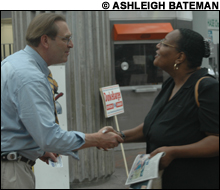
PHIL DUNKELBARGER: here stumping at the Forest Hills T stop, says Congressman Stephen Lynch is betraying his fellow Democrats. |
Down in Connecticut, a battle for the soul of the Democratic Party is raging. Joe Lieberman — the US senator, former vice-presidential and presidential candidate, and squeaky-voiced avatar of Democratic conservatism — is facing a tough primary challenge from Ned Lamont, a liberal telecommunications magnate who accuses Lieberman of abetting the failures of the Bush Administration. Polls show a close race, and there’s already talk of Lieberman running as an independent if Lamont bumps him off in September.Here in Massachusetts, meanwhile, Congressman Stephen Lynch has a primary challenge of his own from a guy named Phil Dunkelbarger, who dreams of playing Lamont to Lynch’s Lieberman. As the Westwood resident tells it, Lynch, too, is guilty of betraying his fellow Democrats: among other things, he backed the Iraq war, even after most Democrats expressed misgivings, and favored government intervention in the Terry Schiavo case. This makes Lynch a de facto ally of the president, Dunkelbarger claims — and given the restiveness of the national electorate, which has people talking about major Republican setbacks in this fall’s midterm elections, it also makes him vulnerable at the ballot box.
“Let’s be candid about it — conditions in this country have gone south in the last five years,” Dunkelbarger argues. “That we could go downhill so fast is mind-boggling, and it’s because so many Democrats were complicit. And Steve Lynch has got to be held accountable for that complicity, because he’s basically been carrying water for the administration for five years. He can be taken out. And he needs to be taken out.”
Strong words, those — even if they’re debatable (more on that later) — and portents of a bitter fight to come. There’s just one problem: with the primary election two months away, it’s not clear that anyone is actually heeding Dunkelbarger’s call to the ramparts.
Told you so
Long-shot candidates who lack buzz tend to blame the media, and Dunkelbarger is no exception. It’s a sweltering June afternoon, and I’ve just met the candidate at the Readville commuter-rail stop in Hyde Park to watch him on the stump. When I note, at the outset, that people don’t seem to be talking about his race, Dunkelbarger bristles. “We gathered five thousand signatures,” he answers. “We’ve been all over the place. The media’s been ignoring us.”
However, he also says — and here, too, Dunkelbarger hews to the standard long-shot script — that things are looking up. The press is starting to notice, Dunkelbarger insists; what’s more, his aggressive retail politicking is having an impact. “I’ve been doing trains since the beginning of February, and I’ve seen the same person at three different locations,” he recounts. “They’re starting to recognize me when they see me, so I know we’re starting to get some traction.”
This blend of resentment and overweening optimism seems all too typical, and I’m ready to dismiss Dunkelbarger as just another quixotic lefty. But then the challenger shifts into his critique of Lynch, and it turns out that as a polemicist, he’s surprisingly effective.
In 2002, before the now-infamous congressional vote giving President Bush the authority to wage war in Iraq, Dunkelbarger was part of a group that traveled to Washington to convince Lynch to vote no. When they met with the congressman, Dunkelbarger recalls, he acknowledged that calls to his office were running seven to one in favor of a no vote. But Lynch also spoke of attending classified briefings in the White House, in which then–CIA director George Tenet and other Bush-administration heavyweights outlined the severity of the threat posed by Saddam Hussein.
To this day, Lynch cites those briefings as critical to his eventual decision to vote yes. (When the Phoenix asked Lynch about the seven-to-one figure, he acknowledged that constituent feedback was “heavily in favor” of a no vote, but added that opponents were more likely to call than proponents.) Dunkelbarger, however, points out that the Bush administration appointed John Poindexter and Elliott Abrams — both of whom were previously convicted of lying to Congress — to key positions in the run-up to the war. Lynch, he believes, had ample cause for skepticism.
“You know you can’t believe these people,” Dunkelbarger says. “You have a good suspicion they don’t have much regard for the truth. Ted Kennedy, your senior senator, is telling you ‘go slow’, and your constituents are telling you seven to one not to do it. Why would you do it? The best face you can put on it is that the guy has extremely, extremely poor judgment, in the face of all this evidence, to decide to exercise leadership and vote for the resolution.”
Of course, Lynch was hardly the only Democrat to support the resolution. But he was the only member of the Massachusetts delegation to support the GOP’s “Stay the Course in Iraq” resolution earlier this month. “He was all alone this time,” Dunkelbarger says. “He’s the only one who voted with the Republicans. Unbelievable.”